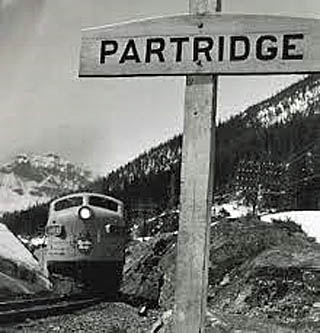
Calgary Alberta - Canadian Pacific Railway (CP) is pushing back on the transport minister's order regarding the use of rail car
handbrakes, seeking changes to a new rule enacted after the fatal train wreck near Field on 4 Feb 2019.
Transport Minister Marc Garneau issued the order four days after a 112 car CP grain train sped out of control down a track in the Rocky Mountains and derailed,
killing the three crew members.
The new rule requires that operators of trains halted in an emergency stop on a mountain grade apply a "sufficient" number of handbrakes to prevent
the train from rolling away.
An investigator with the Transportation Safety Board (TSB) said there were no handbrakes applied on the train, which had made an emergency stop near the
B.C.-Alberta border (Partridge Siding) after its crew had trouble controlling its speed.
Calgary based CP presented alternative measures to the time consuming task of manually setting handbrakes in a rail industry meeting convened by Transport
Canada last week, according to an industry source familiar with the meeting, but did not convince regulators the minister's directive should be
replaced.
Separately, on Monday, another CP crew was forced to hit the emergency brakes after losing control of a 109 car grain train on the same stretch of westbound
tracks, coming to a halt without derailing near the town of Field, The Globe and Mail has learned.
CP's train had no handbrakes applied when it moved, the minister's order would require a similar train to use handbrakes on about 98 rail cars.
"The ministerial order will stay in place at least until the TSB's investigation is complete and we get all the answers needed to inform next steps,"
said Delphine Denis, spokeswoman for Mr. Garneau.
Frederica Dupuis, a spokeswoman for Transport Canada (TC), said the industry briefing called by the federal department was a "technical meeting on
operational matters" intended to "facilitate exchanges of best practices."
She said no date has been set for another meeting and declined to talk about positions taken by CP and other industry members at the meeting.
"TC can't speak on behalf of other organizations and recommends contacting them directly for comments," Ms. Dupuis said.
TC issued no decision at the conclusion of the meeting, which was also attended by representatives of Canadian National Railway (CN), the Railway Association
of Canada, Teamsters Canada Rail Conference, and TC consultants, The Globe has learned.
Don Ashley, national legislative director for the Teamsters, said the union that represents train crews at CP, CN, and other railways is in favour of the
minister's order.
"We think it should remain in place until such time as we have all the details and the investigation reports and then we can determine what a safe process
is," Mr. Ashley said.
CP would not say what measures it proposes to replace the minister's order with and declined interview requests.
"Given the ongoing TSB investigation, CP is unable to comment at this time," said Jeremy Berry, a CP spokesman.
Victoria Savoy, a spokeswoman for the Railway Association of Canada, declined to comment.
CP wants to employ what it deems a safe alternative to the handbrake rule that will not hamper operations by delaying traffic.
Applying and releasing rail car handbrakes are slow, physically difficult tasks, measures that could be required as often as four times a month in the winter,
said a source The Globe agreed not to identify because they are not authorized to speak publicly on the matter.
The broader rail industry supports lifting the handbrake order once a safe alternative procedure can be found and proven to secure trains, the source
said.
The 4 Feb 2019 crash killed locomotive engineer Andrew Dockrell, conductor Dylan Paradis, and trainee Daniel Waldenberger-Bulmer.
They were called to drive the train down the mountain after the previous crew had to apply the train's emergency brakes to control its speed.
After emergency air brakes are applied, a train must halt while the air system is recharged.
The train sat on the steep tracks for two hours in the bitter cold when it began rolling on its own, reaching speeds well above the 32 kph limit before
derailing at a bridge and plunging more than 60 metres down the mountainside into the Kicking Horse River.
CP and TC did not require trains halted by an emergency stop to use handbrakes to secure the cars while the air brake system recharges.
Days after the fatal crash, CP revised its procedures for trains that made an emergency brake stop on mountain grades.
The new rules required crews to set handbrakes on 25 cars, and to apply all cars' air brakes by hand in a light or "retainer" setting.
However, Mr. Garneau issued his tougher order a day later, deeming CP's did not go far enough, said one source familiar with the matter.
The Garneau order requires handbrakes be applied according to the weight of the train and the gradient of the track.
For a train weighing about 15,000 tonnes on a 2.2 percent grade, similar to Train 301, hand-brakes are required on 98 cars.
The guidelines in the order are identical to those in TC's Canadian Railway Operating Rules for trains left "unattended."
Meanwhile, TC has inspected the brakes on the train that underwent the emergency brake application on Monday, said Dave Fulton, a general chairman with the
Teamsters union.
Because half of the train came to a stop on the mountain grade, handbrakes were applied according to the Minister's order, he said.
"You don't put the train into emergency if it's in control," Mr. Fulton said.
"It's a last measure."
Alexandre Fournier, a spokesman for the TSB, said the investigator is following up with CP on the incident.
"We're aware of the event," he said.
Eric Atkins.
provisions in Section 29 of the Canadian
Copyright Modernization Act.

